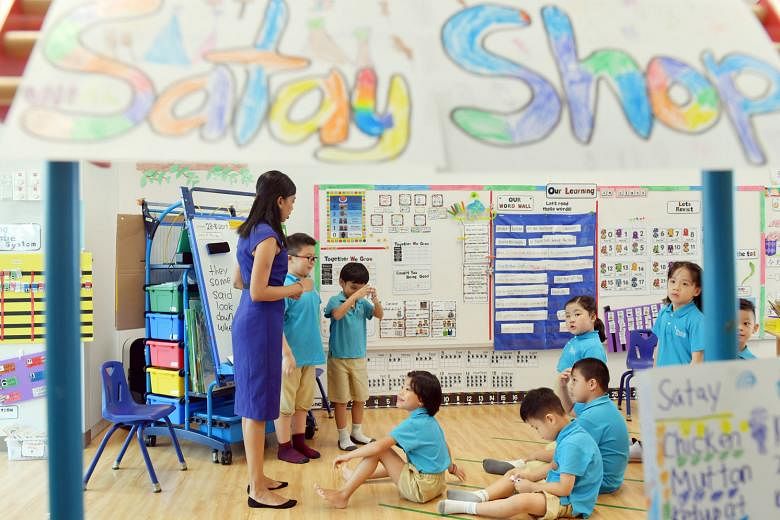At Sunday's National Day Rally, Prime Minister Lee Hsien Loong unveiled a concerted push to improve the quality of and access to pre-schools - increasing places, expanding the share of state pre-schools and giving teachers better training and prospects. He said about the move: "If we get this right, we will foster social mobility and sustain a fair and just society."
The phrase "fair and just society" is not new. But it is noteworthy for the comeback it has made in Singapore's political vocabulary of late.
If you look just at the National Day Rally - the biggest political speech of the year - and its shorter cousin, the National Day Message, the expression has been uttered six times by PM Lee since 2011 - once each in 2011 and 2012, twice in 2013, then once each again in 2015 and 2017. They were spoken in the context not just of education but housing, healthcare, social mobility and individuals giving back to society.
In contrast, from 2004 (when Mr Lee became Prime Minister) to 2010, this set of words did not appear in either annual speech - although, it must be said, some policy announcements were in a similar vein.
But there can be little doubt that the phrase is in vogue. And it is probably not an exaggeration to say that since 2011, PM Lee has made the "fair and just society" an integral part of his vision for Singapore.

The year - 2011 - also saw the People's Action Party (PAP) suffer its worst general election performance since Independence. It lost six seats, throwing two ministers out of office. It embarked on a deep rethink of its governance model.
The "fair and just society" slogan has deep roots in PAP history. It was central to the PAP's early platforms, and was repeated at least up to the 1970s.
In 1957, Mr Lee Kuan Yew, then still in opposition, said at a by-election: "We want to establish an independent, united Malaya in which we shall establish within the framework of the democratic non-communist system a fair and just society, a socialist society in which no man can exploit his fellowman."
He won that by-election, and, less than two years later, voters made him Singapore's first Prime Minister in the 1959 General Election.
The 1963 Yang Di-Pertuan Negara speech to open the Legislative Assembly, written by Mr Lee's Cabinet, included the line: "No single factor is more likely to bring about a more fair and just society than equal opportunities for education for all."
At the 1976 General Election, Mr Lee again said: "In a more fair and just society, (the communists) have not made much headway."
PM Lee Hsien Loong has acknowledged this link to the past. Recording the 2015 National Day Message at Victoria Concert Hall, he said: "It was here that Mr Lee Kuan Yew launched the PAP (in 1954) and inaugurated the long struggle for a fair and just society."
BACK TO ITS ROOTS
What, then, is the significance of this rediscovery of an oft-used expression from PAP's earlier years? First, it signals that the PAP has not forgotten its left-leaning roots. It still cares about more equal outcomes, to cite a left-leaning phrase.
A brief digression here: The equality debate is a debate in the West between the right and the left on what kind of society is most desirable. Those on the left favour greater "equality of outcome", or reducing differences in material wealth and well-being across society. That usually means some form of taking from the rich and giving to the poor. The left wants to do this for its own sake - greater equality of outcome is valued as an end in itself.
Those on the right might sometimes agree to a redistribution of wealth to achieve a more stable society, but they otherwise don't like the concept of equality of outcome very much.
The concept the right prefers by far is "equality of opportunity": that as long as each person has similar opportunities in life to reach his individual potential and to excel in his chosen path, there is no need to reduce disparity. The market should be allowed to fairly reward those who make a bigger contribution.
The left's answer to this sometimes is that equality of opportunity is in theory a good thing and should be made available as much as possible. But it is ultimately unachievable in reality - that's why equality of outcome is what's really needed.
Back to PM Lee's fair and just society: It is partly an attempt to reclaim the PAP's left-leaning roots - hence his reference to the party's founding at Victoria Concert Hall.
Since 2011, the PAP has rolled out a number of policies that can be deemed purely redistributive. These include introducing MediShield Life, the universal health insurance programme for life; targeting the healthcare and retirement needs of the elderly, through the Pioneer Generation Package and the Silver Support Scheme; extending subsidies for aged and child care from low- to middle-income families; and increasing public grants for those who buy public housing flats. Of course, voters to the left of the PAP will want to see more redistribution, even as they applaud these post-2011 moves.
STRENGTHENING MERITOCRACY
The second way the new "fair and just society" agenda can be understood through the lens of the equality debate is in its concurrently strong "equality of opportunity" focus. The vision re-states a determination to maintain Singapore's system of meritocracy, which has come under stress, with critics saying the great social leveller - education - has become dysfunctional.
Families that can spend more on pre-schooling, tuition and enrichment classes are chalking up so big an advantage for their offspring, the argument goes, that the continued relevance of meritocracy as a core national principle is in doubt.
Elite schools like Raffles Institution (RI) are cited examples. When Singapore's first two prime ministers, Mr Lee Kuan Yew and Mr Goh Chok Tong, went to RI, its socioeconomic profile was much more diverse.
PM Lee Hsien Loong, who didn't go to RI but went to another family of elite schools - Nanyang Kindergarten and Primary School - made a similar point last month at its 100th anniversary. He said that taking the kindergarten school bus, he used to see kids being dropped off in "working-class neighbourhoods". Today, the profile is different and "many of the parents are professionals".
Hence this fresh call for a "fair and just society", to ensure social mobility and a working meritocracy in our time. A step in this direction was the 2013 announcement that primary schools would each have to reserve 40 places for those with no prior connections.
The raising of pre-school standards announced this year follows along this path. This is the culmination of a series of big changes on this front since 2011 - again, as part of this new "fair and just" agenda. As PM Lee made clear, the state is now poised to take a much bigger role in providing pre-school education.
In the 1990s and 2000s, the Government preferred a much smaller, regulatory role for the state in pre-schools, despite calls in Parliament and outside for more state resources for the sector.
Since 2011, it has moved boldly. A milestone was the new Ministry of Education (MOE) kindergartens, which started enrolling pupils in 2014. PM Lee said on Sunday that the number of MOE kindergartens would more than triple to 50 by 2023.
In some ways, the pre-school move advances both "equalities". On the one hand, pre-school education is a consumption good in itself - an "outcome" - and if every pre-school is a good pre-school, there is greater outcome equality.
On the other hand, pre-school education is also a means to an end - to equip every child to compete fairly later on in the meritocratic system. This forges equality of opportunity.
Thus, the increase in pre-school investment is in a political sweet spot - it is a policy both the right and the left can celebrate.
On the whole, what we can say about the new "fair and just" agenda is that it takes ideas from both the left and the right. The risk here is that both sides of the spectrum might not be fully satisfied.
But in Singapore, the PAP has always prided itself on such ideological messiness. It says it prefers pragmatism.
In any case, what matters more than political ideology is how policies advancing a fair and just society can improve real lives.
In the case of pre-schools: When a couple on low incomes work long shifts to support four kids and two sickly parents - not an implausible scenario - the chances are that even with subsidies, their kids will go to the cheapest pre-school.
If this pre-school prepares them inadequately for later life, research has shown that it would consolidate their disadvantage, making it more likely that they turn into low-income workers themselves.
State investments to make every pre-school a good school thus have great potential to alter the course of this family.
But what if even this is not enough? What if struggling parents stop sending the kids to pre-school, or send them irregularly?
This is where a case can be made for nationalising pre-schools, making attendance free and compulsory, like primary schools.
The Government has said that it does not favour nationalisation of pre-schools, arguing that it reduces choice and diversity. But the counter-argument is that not many think it is a problem that nationalised primary schools lack diversity.
The debate goes on, as it should.
For now, it is heartening that the 2017 Rally speech makes it clear that the Government will continue with the post-2011 slew of policies in the direction of a fair and just society.
The PAP was rewarded at the 2015 General Election, at least in part because of this shift, and momentum since 2015 on these policies has been maintained - which is not a bad state of affairs.


